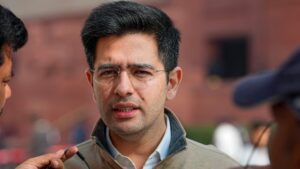
New Delhi, Jul 25 (PTI) The government’s decision to remove indexation benefit on sale of old property will result in huge inflow of black money in real estate and investments in the sector will go down, AAP Rajya Sabha member Raghav Chadha said on Thursday.
Asking the government to roll back the proposal, Chadha, while taking part in the discussion on the Union Budget 2024-25, said people will never be able to buy their “dream homes”.
“Restore indexation on long-term capital gains. Throughout the world, to woo investors to invest they are incentivised. In this country, by removing indexation we are disincentivising the investor class,” he said, adding that removing indexation is not imposing tax but it is equivalent to “penalising investors”.
He said as a result of the step proposed by Finance Minister Nirmala Sitharaman in the Budget 2024-25, individuals selling old properties will incur higher tax outgo.
“If you do not bring back indexation three things will happen in this country. First, investment in real estate will go down and people will never be able to buy their ‘dream homes’,” Chadha asserted.
He further said there will be undervaluation of property deals, people will buy properties at ‘circle rates’ and will never disclose the real value of the property.
“Third, there will be a huge inflow of black money if you don’t roll back this decision to withdraw indexation,” he said.
In the Union Budget 2024-25, the government proposed reducing the long-term capital gains tax on immovable properties to 12.5 per cent from 20 per cent, but removed the indexation benefits to adjust for inflation.
As per the Memorandum to the Union Budget, with rationalisation of rate to 12.5 per cent, indexation available under Section 48 of the Income Tax Act has been proposed to be removed for calculation of any long-term capital gains, which is presently available for property, gold and other unlisted assets.
Chadha also highlighted the high tax burden faced by common people and asked for a comprehensive review of both direct and indirect taxes.
“We impose taxes like the Europeans do, to get services like sub-Saharan countries,” he added.
Taking part in the discussion, Debashish Samantaray of the BJD said the central government has given a raw deal to all eastern states like Odisha, Jharkhand, West Bengal in the Budget.
He charged that in spite of Odisha giving 20 seats to the BJP, there was hardly anything for the state in the Union Budget.
He noted that “regional aspiration should be addressed”, and asked the central government to treat all states as equal.
RJD’s Sanjay Yadav attacked the government stating the Budget had nothing for the poor and marginalised and only catered to the rich and powerful.
He noted that his party has been demanding special category status for Bihar for a very long time.
Yadav said instead of dividing people on the basis of religion and caste, the government should work towards generating employment in the country.
Medha Vishram Kulkarni of BJP and Rajani Ashokrao Patil of INC also participated in the debate.
C V Shanmugham of AIADMK said allocation in the Budget does not significantly address the pressing needs of Tamil Nadu’s infrastructure, health care, Social justice and education.
The government has mentioned 76 projects in Tamil Nadu, but most of them are pre-existing ones getting a facelift. Moreover, in the Budget, no help in flood mitigation was provided, despite the state being prone to cyclones. There is no mention of a linkage of Kaveri and Godawari in the Budget, he said.
Samirul Islam of AITC said this Budget is anti-people, anti-poor and anti-Bengal. It only satisfies Bihar and Andhra Pradesh’s allies and is to save the government. “The Budget has deprived Bengal,” he said.
It has also ignored the people, especially the unorganised sector. 83 per cent of India’s workforce is employed by unorganised sectors and failed to announce a comprehensive scheme for them and migrant workers, he said.
M Mohamed Abdulla of the DMK said the Budget has provoked a constructive debate and disappointment in Tamil Nadu, a state known for its economic contributions.
Tamil Nadu expected support and recognition in the budgetary allocations, but received nothing.
The government is supposed to represent the people of the country as a whole. However, it is very unfortunate and unfair to see unequal distribution to the state governments, especially for the non-BJP ruled states like Tamil Nadu which provides the highest tax for the government, he said.



